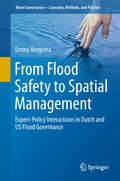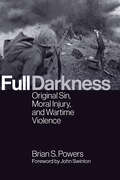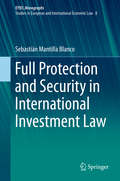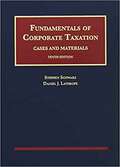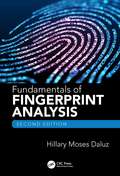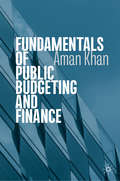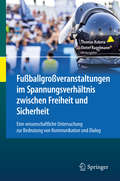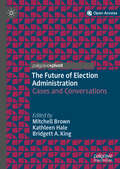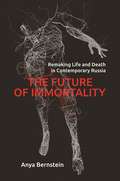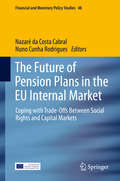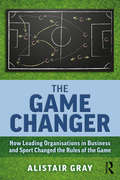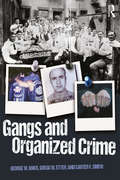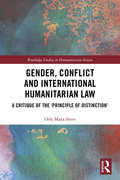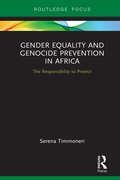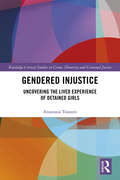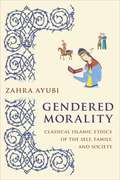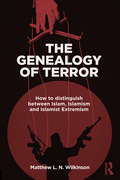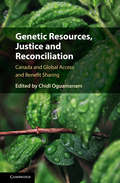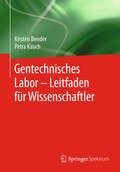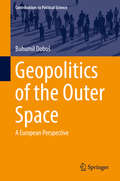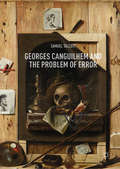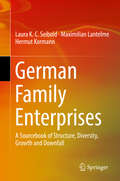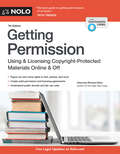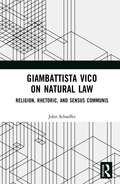- Table View
- List View
From Flood Safety to Spatial Management: Expert-Policy Interactions in Dutch and US Flood Governance (Water Governance - Concepts, Methods, and Practice)
by Emmy BergsmaThis book deals with the introduction of a new type of “spatial measures" in flood governance. In contrast to traditional “safety measures" that aim to provide protection against floods by building structural flood defenses such as levees and flood walls, the goal of spatial measures is to reduce the exposure to flood risks by changing the spatial layout of flood-prone areas. By limiting developments and flood-proofing buildings in areas at risk to flooding, investments in structural flood defenses can be circumvented and vulnerabilities reduce. World-wide, spatial measures are gaining attractiveness as a response strategy to increasing flood risks caused by climate change and urbanization. The introduction of spatial measures in flood governance involves more than the simple development of new policies and laws. Research has demonstrated that the implementation of spatial measures can have huge implications for how costs and responsibilities are divided between different levels of governance and between public and private actors, changing the whole organization behind flood governance. Both for the effectiveness and for the legitimacy of spatial flood governance strategies, it is important that these distributive implications are well understood. This book describes the introduction of spatial measures in the context of two very different delta countries: the Netherlands and the United States. In the United States, a spatial flood governance strategy was already developed in de mid-20th century whereas in the Netherlands, a safety paradigm institutionalized over the course of the 20th century and spatial measures have only recently been introduced. By analyzing the science-policy interactions underlying the implementation of spatial measures in both countries, this book shows how under the influence of different types of experts (engineers in the Netherlands and social geographers in the United States) different spatial flood management strategies emerged with different distributive implications, each with its own challenges for effectiveness and legitimacy.
Full Darkness: Original Sin, Moral Injury, and Wartime Violence
by John Swinton Brian S. PowersA theological treatment of war, trauma, and the fundamental character of human existence In Full Darkness theologian and wartime veteran Brian Powers argues that the Augustinian concept of original sin can illuminate the nature of wartime violence, particularly through the lens of veteran trauma. He shows precisely how sin and war both cause human identity, agency, and hope to be lost.Powers explores sin as a pathogenic disfigurement that shapes cultural values and ethical ideas, frequently resulting in moral injury. Combat veterans experience a humanity deprived of grace and are devoured by the forces of war, often suffering post-traumatic stress disorder. But Powers provides a ray of hope and a path towards healing.Ideal for veterans, chaplains, and pastors, Full Darkness offers a new perspective on the cultural understanding of military violence, provides theological help for those drowning in guilt and shame, and paves the way for reclaiming positive human agency and identity.
Full Darkness: Original Sin, Moral Injury, and Wartime Violence
by Brian S. PowersA theological treatment of war, trauma, and the fundamental character of human existence In Full Darkness theologian and wartime veteran Brian Powers argues that the Augustinian concept of original sin can illuminate the nature of wartime violence, particularly through the lens of veteran trauma. He shows precisely how sin and war both cause human identity, agency, and hope to be lost.Powers explores sin as a pathogenic disfigurement that shapes cultural values and ethical ideas, frequently resulting in moral injury. Combat veterans experience a humanity deprived of grace and are devoured by the forces of war, often suffering post-traumatic stress disorder. But Powers provides a ray of hope and a path towards healing.Ideal for veterans, chaplains, and pastors, Full Darkness offers a new perspective on the cultural understanding of military violence, provides theological help for those drowning in guilt and shame, and paves the way for reclaiming positive human agency and identity.
Full Protection and Security in International Investment Law (European Yearbook of International Economic Law #8)
by Sebastián Mantilla BlancoThis book provides a comprehensive study of the standard of ‘full protection and security’ (FPS) in international investment law. Ever since the Germany-Pakistan BIT of 1959, almost every investment agreement has included an FPS clause. FPS claims refer to the most diverse factual settings, from terrorist attacks to measures concerning concession contracts. Still, the FPS standard has received far less scholarly attention than other obligations under international investment law. Filling that gap, this study examines the evolution of FPS from its medieval roots to the modern age, delimits the scope of FPS in customary international law, and analyzes the relationship between FPS and the concept of due diligence in the law of state responsibility. It additionally explores the interpretation and application of FPS clauses, drawing particular attention to the diverse wording used in investment treaties, the role ascribed to custom, and the interplay between FPS and other treaty-based standards. Besides delivering a detailed analysis of the FPS standard, this book also serves as a guide to the relevant sources, providing an overview of numerous legal instruments, examples of state practice, arbitral decisions, and related academic publications about the standard.
Fundamentals Of Corporate Taxation (University Casebook Ser.)
by Stephen Schwarz Daniel LathropeFundamentals of Corporate Taxation (University Casebook Series) 10th Edition
Fundamentals of Fingerprint Analysis, Second Edition
by Hillary Moses DaluzBuilding on the success of the first Edition—the first pure textbook designed specifically for students on the subject—Fundamentals of Fingerprint Analysis, Second Edition provides an understanding of the historical background of fingerprint evidence, and follows it all the way through to illustrate how it is utilized in the courtroom. An essential learning tool for classes in fingerprinting and impression evidence—with each chapter building on the previous one using a pedagogical format—the book is divided into three sections. The first explains the history and theory of fingerprint analysis, fingerprint patterns and classification, and the concept of biometrics—the practice of using unique biological measurements or features to identify individuals. The second section discusses forensic light sources and physical and chemical processing methods. Section three covers fingerprint analysis with chapters on documentation, crime scene processing, fingerprint and palm print comparisons, and courtroom testimony. New coverage to this edition includes such topics as the biometrics and AFIS systems, physiology and embryology of fingerprint development in the womb, digital fingerprint record systems, new and emerging chemical reagents, varieties of fingerprint powders, and more. Fundamentals of Fingerprint Analysis, Second Edition stands as the most comprehensive introductory textbook on the market.
Fundamentals of Public Budgeting and Finance
by Aman KhanBudgeting is probably the single most important function in government, considering the amount of money a government spends each year on various expenditure programs and activities, as well as the time it spends in preparing the budget, appropriating funds for these activities and, finally, executing them. This book integrates the complex theory and practice of public budgeting into a single text. Written in a simple, concise and easy to understand manner, The Fundamentals of Public Budgeting and Finance captures the multidimensional perspective of public budgeting that students, as well as practitioners will find useful.
Fußballgroßveranstaltungen im Spannungsverhältnis zwischen Freiheit und Sicherheit: Eine wissenschaftliche Untersuchung zur Bedeutung von Kommunikation und Dialog
by Thomas Kubera Dieter KugelmannDas Buch präsentiert die wissenschaftlichen Ergebnisse des interdisziplinären Forschungsprojektes „Mehr Sicherheit im Fußball – Verbessern der Kommunikationsstrukturen und Optimieren des Fandialogs“. Die aus dem vom Bundesministerium für Bildung und Forschung geförderten Projekt hervorgehenden Erkenntnisse zum Status Quo der Sicherheitsgewährleistung bei Fußballgroßveranstaltungen bieten eine Reihe von Ansätzen zur Verbesserung von Kommunikationsstrukturen und -prozessen. Sie basieren auf Untersuchungen an 25 Vereinsstandorten der ersten drei Profiligen. Das Feld wurde durch Interviews mit Experten aus Fanarbeit, Fanszenen, Polizeibehörden, Vereinen und Kommunen und durch Befragungen von Stadionbesuchern, Fangruppierungen, Reisenden im Fanreiseverkehr und der Bevölkerung erschlossen. Weiterhin wurden rechtliche Stellungnahmen und Empfehlungen erarbeitet sowie eine technische Kommunikationsplattform beforscht, die eine effektive Zusammenarbeit der verschiedenen Akteure ermöglichen soll.
The Future of Election Administration: Cases and Conversations (Elections, Voting, Technology)
by Mitchell Brown Kathleen Hale Bridgett A. KingAs the American election administration landscape changes as a result of major court cases, national and state legislation, changes in professionalism, and the evolution of equipment and security, so must the work of on-the-ground practitioners change. This Open Access title presents a series of case studies designed to highlight practical responses to these changes from the national, state, and local levels. This book is designed to be a companion piece to The Future of Election Administration, which surveys these critical dimensions of elections from the perspectives of the most forward-thinking practitioner, policy, advocacy, and research experts and leaders in these areas today. Drawing upon principles of professionalism and the practical work that is required to administer elections as part of the complex systems, this book lifts up the voices and experiences of practitioners from around the country to describe, analyze, and anticipate the key areas of election administration systems on which students, researchers, advocates, policy makers, and practitioners should focus. Together, these books add to the emerging body of literature that is part of the election sciences community with an emphasis on the practical aspects of administration.
The Future of Immortality: Remaking Life and Death in Contemporary Russia (Princeton Studies in Culture and Technology #23)
by Anya BernsteinA gripping account of the Russian visionaries who are pursuing human immortalityAs long as we have known death, we have dreamed of life without end. In The Future of Immortality, Anya Bernstein explores the contemporary Russian communities of visionaries and utopians who are pressing at the very limits of the human.The Future of Immortality profiles a diverse cast of characters, from the owners of a small cryonics outfit to scientists inaugurating the field of biogerontology, from grassroots neurotech enthusiasts to believers in the Cosmist ideas of the Russian Orthodox thinker Nikolai Fedorov. Bernstein puts their debates and polemics in the context of a long history of immortalist thought in Russia, with global implications that reach to Silicon Valley and beyond. If aging is a curable disease, do we have a moral obligation to end the suffering it causes? Could immortality be the foundation of a truly liberated utopian society extending beyond the confines of the earth—something that Russians, historically, have pondered more than most? If life without end requires radical genetic modification or separating consciousness from our biological selves, how does that affect what it means to be human?As vividly written as any novel, The Future of Immortality is a fascinating account of techno-scientific and religious futurism—and the ways in which it hopes to transform our very being.
The Future of Pension Plans in the EU Internal Market: Coping with Trade-Offs Between Social Rights and Capital Markets (Financial and Monetary Policy Studies #48)
by Nazaré da Costa Cabral Nuno Cunha RodriguesThis edited volume takes a closer look at various European pension-plan models and the recent challenges, trends and predictions related to the design of such schemes. The contributors analyse new ideas, both from national governments and European institutions, and consider current debates on topics such as the Capital Markets Union (CMU) and the so-called ‘European Pillar of Social Rights’ – calling for a new approach to social policy at the European level in response to common challenges, such as ageing and the digital revolution.This interdisciplinary work embraces economic, financial and legal perspectives, while focusing on previously selected coherence aspects in order to ensure that the analyses are comprehensive and globally consistent.
The Game Changer: How Leading Organisations in Business and Sport Changed the Rules of the Game
by Alistair GrayThe Game Changer powerfully demonstrates how some organisations in business and sport have done more than raise their performance; they have also changed the rules of the game or the game itself within their industry. It gives examples of the strategies and governance programmes that have emerged to accomplish this, and the challenges of executing them. This book brings to life strategic management in business, sport and not-for-profit organisations. It explores many of the theories taught on MBA and other professional programmes through case studies from the worlds of sport and business, written by authors who have played a part in the change. Alistair Gray has spent much of his career in senior roles in these sectors and brings a unique insight to the field, as well as providing the reader with tools and techniques for improvement in governance and performance. The Game Changer is essential reading for both professionals looking for methods to improve their own performance and to embed strong principles of governance, and business students looking for real-life lessons from practice.
Gangs and Organized Crime
by George W. Knox Gregg Etter Carter F. SmithIn <i>Gangs and Organized Crime</i>, George W. Knox, Gregg W. Etter, and Carter F. Smith offer an informed and carefully investigated examination of gangs and organized crime groups, covering street gangs, prison gangs, outlaw motorcycle gangs, and organized crime groups from every continent. The authors have spent decades investigating gangs as well as researching their history and activities, and this dual professional-academic perspective informs their analysis of gangs and crime groups. They take a multi-disciplinary approach that combines criminal justice, public policy and administration, law, organizational behavior, sociology, psychology, and urban planning perspectives to provide insight into the actions and interactions of a variety of groups and their members. This textbook is ideal for criminal justice and sociology courses on gangs as well as related course topics like gang behavior, gang crime and the inner city, organized crime families, and transnational criminal groups. <i>Gangs and Organized Crime</i> is also an excellent addition to the professional’s reference library or primer for the general reader.
Gender, Conflict and International Humanitarian Law: A critique of the 'principle of distinction' (Routledge Studies in Humanitarian Action)
by Orly Maya SternThis book conducts a gendered critique of the ‘principle of distinction’ in international humanitarian law (IHL), with a focus on recent conflicts in Africa. The ‘principle of distinction’ is core to IHL, and regulates who can and cannot be targeted in armed conflict. It states that civilians may not be targeted in attack, while combatants and those civilians directly participating in hostilities can be. The law defines what it means to be a combatant and a civilian, and sets out what behaviour constitutes direct participation. Close examination of the origins of the principle reveals that IHL was based on a gendered view of conflict, which envisages men as fighters and women as victims of war. Problematically, this view often does not accord with the reality in ‘new wars’ today in which women are playing increasingly active roles, often forming the backbone of fighting groups, and performing functions on which armed groups are highly reliant. Using women’s participation in ‘new wars’ in Africa as a study, this volume critically examines the principle through a gendered lens, questioning the extent to which the principle serves to protect women in modern conflicts and how it fails them. By doing so, it questions whether the principle of distinction is suitable to effectively regulate the conduct of hostilities in new wars. This book will be of much interest to students of international law, gender studies, African politics, war and conflict studies, and international relations.
Gender Equality and Genocide Prevention in Africa: The Responsibility to Protect
by Serena TimmoneriThis book investigates what impact gender equality has on genocide in Africa, to verify whether it is a missing indicator from current risk assessments and models for genocide prevention. Examining whether States characterised by lower levels of gender equality are more likely to experience genocide, Timmoneri adds gender indicators to the existing early warning assessment for the prevention of genocide. Moreover, the book argues for the formulation of policies directed at the improvement of gender equality not just as a means to improve women's conditions but as a tool to reduce the risk of genocide and mass atrocities. Using case studies from Nigeria, Ethiopia, Angola, Uganda, and Burundi, Timmoneri analyses recent atrocities and explores the role of gender equality as an indicator of potential genocide. Gender Equality and Genocide Prevention in Africa will be of interest to students and scholars of political science, genocide studies, and gender studies.
Gendered Injustice: Uncovering the Lived Experience of Detained Girls
by Anastasia TosouniWithout strong proof, policy advocates along with some scholars have causally linked declines in juvenile offending and incarceration with evidence-based and rehabilitation-oriented policy reform. Such studies have called for a shift back to rehabilitative ideals augmented by innovative strategies that emphasize cultures of care, and in the cases of system-involved girls, ‘gender-responsive’ programs, anchored in feminist literature. These programs have also caught the attention of feminist scholars who cast doubt on both their design and implementation. Gendered Injustice offers a unique contribution to the latter line of scholarship, and critically examines claims of innovation, empowerment, and gender-responsivity in youth correction that currently dominate the field. Drawing on rich ethnographic data, this book uncovers the reality of, and gives voice to, the experiences and continued mistreatment of marginalized girls housed in locked institutions in the US State of California. By providing detailed insight into the detention experiences and the pathways of several young women, this book draws stark comparisons between the lived experience of young women in detention with the official rhetoric of empowerment that dominates public discourse. This book reveals the ways in which institutional policies and practices are designed to neglect and, in many instances, re-victimize inmates. This is essential reading for those engaged in corrections, juvenile justice, gender and crime, and feminist criminology.
Gendered Morality: Classical Islamic Ethics of the Self, Family, and Society
by Zahra M. AyubiIslamic scriptural sources offer potentially radical notions of equality. Yet medieval Islamic philosophers chose to establish a hierarchical, male-centered virtue ethics. In Gendered Morality, Zahra Ayubi rethinks the tradition of Islamic philosophical ethics from a feminist critical perspective. She calls for a philosophical turn in the study of gender in Islam based on resources for gender equality that are unlocked by feminist engagement with the Islamic ethical tradition.Developing a lens for a feminist philosophy of Islam, Ayubi analyzes constructions of masculinity, femininity, and gender relations in classic works of philosophical ethics. In close readings of foundational texts by Abu Hamid Muhammad al-Ghazali, Nasir-ad Din Tusi, and Jalal ad-Din Davani, she interrogates how these thinkers conceive of the ethical human being as an elite male within a hierarchical cosmology built on the exclusion of women and nonelites. Yet in the course of prescribing ethical behavior, the ethicists speak of complex gendered and human relations that contradict their hierarchies. Their metaphysical premises about the nature of the divine, humanity, and moral responsibility indicate a potential egalitarian core. Gendered Morality offers a vital and disruptive new perspective on patriarchal Islamic ethics and metaphysics, showing the ways in which the philosophical tradition can support the aims of gender justice and human flourishing.
The Genealogy of Terror: How to distinguish between Islam, Islamism and Islamist Extremism (Law and Religion)
by Matthew L. WilkinsonIn the first two decades of the twenty-first century, the events of 9/11, 7/7, the War on Terror and the Caliphate and atrocities of the so-called Islamic State have dominated Western consciousness and wreaked havoc in parts of the Muslim-majority world. In their wake, a spate of books has been written explaining the phenomenon of Islamist radicalisation and Jihadism. Nevertheless, for normal citizens, as well as scholars of religion and legal professionals, the crucial question remains unanswered: how is mainstream Islam different from both Islamism and the Islamist Extremism that is used to justify terrorist violence? In this highly original book, which draws upon the author’s experience as an expert witness in Islamic theology in 27 counter-terrorism trials, the author uses the idea of the Worldview, as well as traditional Islamic theology, to answer this question. The book explains not only what Mainstream Islam, Ideological Islamism and Islamist Extremism are in their broad philosophical characteristics and theological particulars, but also explains comprehensively how and why they are both superficially related and yet essentially and fundamentally different. In so doing, the book also illuminates the cast of characters and the development of their ideas that constitute Mainstream Islam, Ideological Islamism and the Non-Violent and Violent Islamist Extremists who constitute the Genealogy of Terror.
Genetic Resources, Justice and Reconciliation: Canada and Global Access and Benefit Sharing
by Chidi OguamanamWhen the oral history of a medicinal plant as a genetic resource is used to develop a blockbuster drug, how is the contribution of indigenous peoples recognized in research and commercialization? What other ethical, legal, and policy issues come into play? Is it accurate for countries to self-identify as users or providers of genetic resources? This edited collection, which focuses on Canada, is the result of research conducted in partnership with indigenous peoples in that country, where melting permafrost and new sea lanes have opened the region's biodiversity, underscoring Canada's status as a user and provider of genetic resources and associated indigenous knowledge. This work is an important resource for scholars, corporations, indigenous peoples, policymakers, and concerned citizens as Canada and other countries take on the implementation of Access and Benefit Sharing policies over genetic resources and associated indigenous knowledge. This book is also available as Open Access.
Gentechnisches Labor – Leitfaden für Wissenschaftler
by Kirsten Bender Petra KauchDieses Buch liefert Ihnen einen umfassenden und praxisnahen Überblick zu Fragen zum Gentechnikgesetz und seiner Rechtsverordnungen im Laboralltag. Ob Transformation bei Bakterien oder virale Gentransfermethoden bei höheren Zellen, die Kenntnis der rechtlichen Rahmenbedingungen und der Sicherheit in den Labors spielt bei allen angewandten Methoden die wichtigste Voraussetzung. Diese werden in Deutschland im Wesentlichen durch das Gentechnikgesetz und die Gentechnik-Sicherheitsverordnung gewährleistet. Worauf muss in der täglichen Praxis in einem „Genlabor“ geachtet werden? Wann haben Studenten, Doktoranden, technischen Mitarbeiter oder der Laborleiter die Verantwortung? Das neue Kompendium „Gentechnisches Labor - Leitfaden für Wissenschaftler“ unterstützt Studierende, Doktoranden, Wissenschaftler und Praktiker, aber auch die Laborleitung und den Betreiber in der Industrie bei der Anwendung der rechtlichen Vorgaben. Die wichtigsten gesetzlichen Vorgaben werden ausführlich einschließlich aktueller Bewertungen der ZKBS und aktueller Rechtsprechung dargestellt.
Geopolitics of the Outer Space: A European Perspective (Contributions to Political Science)
by Bohumil DobošThis book presents a comprehensive geopolitical analysis of European space activities. By studying outer space as a physical and socio-economic space as well as a military-diplomatic area, the author helps readers understand outer space as a geopolitical environment. The book also offers insights into the behavior and strategies of different actors, with a special focus on the European space strategy and the nature of the European space program and diplomacy.
Georges Canguilhem and the Problem of Error
by Samuel TalcottExamining Georges Canguilhem’s enduring attention to the problem of error, from his early writings to Michel Foucault’s first major responses to his work, this pathbreaking book shows that the historian of science was also a centrally important philosopher in postwar France. Samuel Talcott elucidates Canguilhem’s contributions by drawing on previously neglected publications and archival sources to trace the continuity of commitment that led him to alter his early anti-vitalist, pacifist positions in the face of political catastrophe and concrete human problems. Talcott shows how Canguilhem critically appropriated the philosophical work of Alain, Bergson, Bachelard, and many others while developing his own distinct writings on medicine, experimentation, and scientific concepts in an ethical and political endeavor to resist alienation and injustice. And, while suggesting Canguilhem’s sometimes surprising philosophical importance for a range of younger thinkers, the book demonstrates Foucault’s own critical allegiance to Canguilhem’s spirit, techniques, and investigations.
German Family Enterprises: A Sourcebook of Structure, Diversity, Growth and Downfall
by Maximilian Lantelme Hermut Kormann Laura K.C. SeiboldThis professional guide presents an extensive overview of the German family enterprise landscape, with a special focus on its structure and diversity. Drawing on several scientific studies conducted by the authors, its goal is to provide a detailed assessment of the development of German family enterprises. Analyzing data from over 500 family firms, it offers a valuable reference guide for market research and academic research on family-owned enterprises. A unique factor: the authors’ revealing insights into the decline of family firms.
Getting Permission: How to License & Clear Copyrighted Materials Online & Off
by Richard StimIf you’re using copyrighted material, don’t get sued—get permission! Online or off, before you use some or all of a song, photo, book, or any other work covered by copyright law, you need to get permission first. If you don’t, you could end up facing legal action from the rights-holder. This easy-to-use book shows you how to get the rights you need, with step-by-step instructions and more than 30 forms. Find out when permission is required, who to ask, and when (and how much) you can expect to pay. Getting Permission explains: the copyright permission process the public domain (“free” content) how to figure out who owns a copyright website permissions the “fair use” rule school-related permissions license and merchandise agreements (including sample contracts and other forms) and much more. This edition is updated with summaries of recent copyright and fair use cases, as well as dozens of real-life questions from the Dear Rich permissions blog. All forms are downloadable through a special link in the book.
Giambattista Vico on Natural Law: Rhetoric, Religion and Sensus Communis
by John SchaefferThis book introduces the thought of Giambattista Vico (1668-1744) into the discussion about natural law. For many critics, natural law is not natural but a façade behind which lurks the supernatural – that is, revealed religion. While current notions of natural law are based on either Aristotelian/Thomistic principles or on Enlightenment rationalism, the book shows how Vico was the only natural law thinker to draw on the Roman legal tradition, rather than on Greek or Enlightenment philosophy. Specifically, the book addresses how Vico, drawing his inspiration from Roman history, incorporated both rhetoric and religion into a dynamic concept of natural law grounded in what he called the sensus communis: the entire repertoire of values, images, institutions, and even prejudices that a community takes for granted. Vico denied that natural law could ever furnish a definitive answer to moral problems in the social/public sphere. Rather he maintained that such problems had to be debated in the wider arena of the sensus communis. For Vico, as this book argues, natural law principles emerged from these debates; they did not resolve them.
